Article de Paul Mattick initialement publié en ligne sur le site kurasje.org aujourd’hui disparu.
The process of the concentration of capital and political power forces any socially important movement to attempt either to destroy capitalism or to serve it consistently. The old German labor movement could not do the latter and was neither willing nor able to do the forrrer. It functioned neither in accordance with its original ideology nor with its real immediate interests. For a time it served as a control instrument of the ruling classes. First losing its independence, it was soon to lose its very existence.
Essentially the history of this movement is the history of the capitalist market approached from a ‘proletarian’ point of view. The so-called market laws were to be utilized in favor of the commodity labor power. Collective actions should lead to the highest possible wages. `Economic power’ gained in this manner was to be secured by way of social reform. The capitalists, too, increased the organized control over the market. Both sides fostered the monopolistic reorganization of capitalist society though, to be sure, behind their consciously conceived activities there was finally nothing but the expansive need of capital itself. Their policies and aspirations, however much based on real considerations of facts and special needs, were still determined by the fetishistic character of their system of production.
Aside from commodity-fetishism, whatever meaning the market laws may have with regard to special fortunes and losses, and however they may be manipulated by one or another interest group, under no circumstances can they be used in favor of the working class as a whole. It is not the market which controls the people and determines the prevailing social relations but rather the fact that a separate group in society either owns or controls the the means of production and the instruments of suppression.
To overcome capitalism, actions outside the labor-capital-market relations are necessary, actions that do away with both the market and with class relations. Restricted to actions within the framework of capitalism, the old labor movement was bound to destroy itself or be destroyed from without. It was destined either to be broken up internal y by its own revolutionary opposition, which would give rise to new organizations, or doomed to be destroyed by the capitalistic change from a market- to a controlled-market economy and the accompanying political alterations.
I.
The first world war revealed more than anything else that the labor movement was part and parcel of bourgeois society. The various organizations in every nation proved that they had neither the intention nor the means to fight capitalism, that they were interested only in securing their own existence within the capitalist structure. In Germany this was especially obvious because within the international movement the German organizations were the largest and most unified. To hold onto what had been built up since Bismarck’s anti-socialist laws, the oppositional minority within the Socialist Party displayed a self-restriction to an extent unknown in other countries. But then, the exiled Russian opposition had less to lose; it had, furthermore, split away from the reformists and class-collaborationists a decade before the outbreak of the war. And it is quite difficult to see in the meek pacifistic arguments of the Independent Labor Party any real opposition to the social patriotism that had saturated the British labor movement. But more had been expected of the German left-wing than of any other group in the International and its behavior at the outbreak of the war was therefore particularly disappointing. Apart from the psychological con ditions of individuals, this behavior was the product of the organizationfetishism prevailing in the movement.
This fetishism demanded discipline and strict adherence to democratic formulas – the minority must submit to the will of the majority. And although it is clear that under capitalistic conditions these `democratic’ formulas merely hide facts to the contrary, the opposition failed to perceive that democracy within the labor movement did not differ from bourgeois democracy in general. A minority owned and controlled the organizations just as the capitalist minority owns and controls the means of production and the state apparatus. In both cases, the minorities by virtue of this control determine the behavior of the majorities. But by force of traditional procedures, in the name of discipline and unity, uneasy and against its better knowledge, the anti-war minority supported Social-Democratic chauvinism. There was just one man in the German Reichstag of August 1914 – Fritz Kunert – who was not able to vote for war credits but who was also not able to vote against them and thus, to satisfy his conscience, abstained from voting altogether. In the spring of 1915 Liebknecht and Ruehle were the first to vote against the granting of war credits to the government. They remained alone for quite some time and found new companions only to the degree that the chances for a victorious peace disappeared in the military stalemate. After 1916 the radical anti-war attitude was supported and soon swallowed up by a bourgeois movement in search of a negotiated peace, a movement which, finally, was to inherit the bankrupt stock of German imperialism.
As violators of discipline Liebknecht and Ruehle were expelled from the Social-Democratic Reichstag fraction. Together with Rosa Luxemburg, Franz Mehring and others, more or less forgotten by now, they organized the group, Internationale, publishing a magazine of the same title in order to uphold the idea of internationalism in the warring world. In 1916 they organized the Spartakusbund which cooperated with other left-wing formations such as the Internationale Socialisten with Julian Borchardt as their spokesman, and the group around Johann Knief and the radical Bremen paper, Arbeiterpolitik. In retrospect it seems that the last-named group was the most advanced, that is, advanced away from Social-Democratic traditions and toward a new approach to the proletarian class struggle. How much the Spartakusbund was still adhering to the organization and unity fetish that ruled the German labor movement came to light in their vacillating attitude toward the first attempts at re-orienting the international socialist movement in Zimmerwald and Kienthal. The Spartacists were not in favor of a clean break with the old labor movement in the direction of the earlier Bolshevik example. They still hoped to win the party over to their own position and carefully avoided irreconcilable policies. In April 1917 the Spartakusbund merged with the Independent Socialists which formed the center of the old labor movement but was no longer willing to cover up the chauvinism of the conservative majority-wing of the Social-Democratic Party. Relatively independent, yet still within the Independent Socialist Party, the Spartakusbund left this organization only at the end of the year 1918.
II.
Within the Spartakusbund Liebknecht’s and Luxemburg’s position had been attacked by the Bolsheviks as inconsistent. And inconsistent it was but for pertinent reasons. At first glance, the main reason seemed to be based on the illusion that the Social-Democratic Party could be reformed. With changing circumstances, it was hoped, the masses would cease to follow their conservative leaders and support the left-wing of the party. And although such illusions did exist, first with regard to the old party and later with regard to the Independent Socialists, they do not altogether explain the hesitancy on the part of the Spartacist leaders to adopt the ways of Bolshevism. Actually, the Spartacists faced a dilemma no matter in which direction they looked. By not trying – at the right time – to break resolutely with Social-Democracy, they forfeited their chance to form a strong organization capable of playing a decisive role in the expected social upheavals. Yet in view of the real situation in Germany, in view of the history of the German labor movement, it was quite difficult to believe in the possibility of quickly forming a counter-party to the dominant labor organizations. Of course, it might have been possible to form a party in the Leninist manner, a party of professional revolutionists, willing to usurp power, if necessary, against the will of the majority of the working class. But this was precisely what the people around Rosa Luxemburg did not aspire to. Throughout the years of their opposition to reformism and revisionism, they had never narrowed their distance from the Russian `left,’ from Lenin’s concept o£ organization and revolution. In sharp controversies, Rosa Luxemburg had pointed out that Lenin’s concepts were of a Jacobin nature and inapplicable in Western Europe where not a bourgeois but a proletarian revolution was on the order of the day. Although she, too, spoke of the dictatorship of the proletariat it meant, to her, in distinction to Lenin, `the manner in which democracy is employed, not in its abolition: – it was to be the work of the class, and not of a small minority in the name of the class.’
Enthusiastically as the Spartacists greeted the overthrow of Czarism, they did not lose their critical capacities, nor did they forget the character of the Bolshevik party, nor the historical limitations of the Russian Revolution. But regardless of the immediate realities and the final outcome of this revolution, it had to be supported as a first break in the imperialist phalanx and as the forerunner of the expected German revolution. Of the latter many signs had appeared in strikes, hunger riots, mutinies and all kinds of passive resistances. But the growing opposition to the war and to Ludendorff’s dictatorship did not find organizational expression to any significant extent. Rather than going to the left, the masses followed their old organizations, which lined up with the liberal bourgeoisie. The upheavals in the German Navy and finally the November rebellion were carried on in the spirit of SocialDemocracy, that is, in the spirit of the defeated German bourgeoisie.
The German Revolution appeared to be more significant than it really was. The spontaneous enthusiasm of the worker was more for ending the war than for changing existing social relations. Their demands, expressed through workers’ and soldiers’ councils, did not transcend the possibilities of bourgeois society. Even the revolutionary minority, and here particularly the Spartakusbund, failed to develop a consistent revolutionary program. Its political and economic demands were of a two-fold nature: they were constructed to serve as demands to be agreed upon by the bourgeoisie and its Social-Democratic allies, and as slogans of a revolution which was to do away with both bourgeois society and its supporters.
Of course, within the ocean of political mediocrity that was the German revolution there were revolutionary streams which warmed the hearts of the radicals and induced them to undertake actions historically quite out of place. Partial successes, due to the temporary stunning of the ruling class and the general passivity of the broad masses – exhausted as they were by four years of hunger and war – nourished the hope that the revolution might end in a socialist society. Only no one really knew what a socialist society would be like, what steps ought to be taken to usher it into existence. « All power to the workers’ and soldiers’ councils, » however attractive as a slogan, still left all essential questions open. The revolutionary struggles that followed November 1918 were thus not determined by the consciously concocted plans of the revolutionary minority but were thrust upon it by the slowly developing counter-revolution which was backed by a majority of the people. The fact was that the broad German masses inside and outside the labor movement did not look forward to the establishment o£ a new society, but backwards to the restoration of liberal capitalism without its bad aspects, its political inequalities, its militarism and imperialism. They merely desired the completion of the reforms started before the war which were designed to lead into a benevolent capitalistic system.
The ambiguity which characterized the policy of the Spartakusbund was largely the result of the conservatism of the masses. The Spartacist leaders were ready, on the one hand, to follow the clear revolutionary course desired by the so-called ‘ultra-left’ and on the other hand they felt sure that such a policy could not be successful in view of the prevailing mass attitude and the international situation.
The effect of the Russian Revolution upon Germany had hardly been noticeable. Nor was there any reason to expect that a radical turn in Germany would have any greater repercussions in France, England and America. If it had been difficult for the Allies to interfere decisively in Russia, they would face lesser difficulties in crushing a German communist uprising. Emerging from the war victorious, the capitalism of these nations had been enormously strengthened; there was no real indication that their patriotic masses would refuse to fight against a weaker revolutionary Germany. At any rate, aside from such considerations there was little reason to believe that the German masses, engaged in getting rid of their arms, would resume a war against foreign capitalism in order to get rid of their own. The policy which was apparently the most `realistic’ for dealing with the international situation and which was soon to be proposed by Wolfheim and Lauffenberg under the name of National-Bolshevism was still unrealistic in view of the real power relations after the war.
The plan to resume the war with Russia’s help against Allied capitalism failed to consider that the Bolsheviks were neither ready nor able to participate in such a venture. Of course, the Bolsheviks were not adverse to Germany or any other nation making difficulties for the victorious imperialists, yet they did not encourage the idea of a new-scale war to carry on the `world revolution.’ They desired support for their own regime, whose permanency was still questioned by the Bolsheviks themselves, but they were not interested in supporting revolutions in other countries by military means. Both to follow a nationalistic course, independent of the question of alliances, and to unite Germany once more for a war of `liberation’ from foreign oppression was out of the question for the additional reason that those social layers which the `national revolutionists’ would have to win over to their cause were precisely the people who ended the war before the complete defeat of the German armies in order to prevent a further spreading of `Bolshevism.’ Unable to become the masters of international capitalism, they had preferred to maintain themselves as its best servants. Yet, there was no way of dealing with international German questions which did not involve a definite foreign policy. The radical German revolution was thus defeated even before it could arise both by its own and by world capitalism.
The need to consider seriously international relations never arose, however, for the German Left. Perhaps this was the clearest indication of its insignificance. Neither was the question as to what to do with political power, once it was captured, raised concretely. No one seemed to believe that these questions would have to be answered. Liebknecht and Luxemburg felt sure that a long period of class struggle was facing the German proletariat with no sign of an early victory. They wanted to make the best of it, suggesting a return to parliament and to trade-union work. However, in their previous activities they had already overstepped the boundaries of bourgeois politics; they could not return to the prisons of tradition. They had rallied around themselves the most radical element of the German proletariat which was now determined to consider any fight the final struggle against capitalism. These workers interpreted the Russian Revolution in accordance with their own needs and their own mentality; they cared less about difficulties lurking in the future than about destroying as much as possible the forces of the past. There were only two ways open for the revolutionists: either to go down with the forces whose cause was lost in advance, or to return to the fold of bourgeois democracy and perform social work for the ruling classes. For the real revolutionist there was, of course, only one way: to go down with the fighting workers. This is why Eugen Levine spoke of the revolutionist as a « dead person on furlough, » and why Rosa Luxemburg and Karl Liebknecht went to their death almost somnambulistically.
III.
The fact that the international bourgeoisie could conclude its war with no more than the temporary loss of the Russian business determined the whole post-war history down to the Second World War. In retrospect, the struggle of the German proletariat from 1912 to 1923 appeared as minor frictions that accompanied the capitalistic re-organization process which followed the war-crisis. But there has always been a tendency to consider the by-products of violent changes in the capitalistic structure as expressions of the revolutionary will of the proletariat. The radical optimists, however, were merely whistling in the dark. The darkness was real, to be sure, and the noise was encouraging, yet at this late hour there is no need to take it seriously. As exciting as it is to recall the days of proletarian actions in Germany – the mass meetings, demonstrations, strikes, street fights, the heated discussions, the hopes, fears, and disappointments, the bitterness of defeat and the pain of prison and death – yet no lessons but negative ones can now be drawn from all these undertakings. All the energy and all the enthusiasm were not enough to bring about a social change or to alter the contemporary mind. The lesson learned was how not to proceed. How to realize the revolutionary needs of the proletariat was not discovered.
The emotional upheavals provided a never-ending incentive for research. Revolution, which for so long had been a mere theory and a vague hope, had appeared for a moment as a practical possibility. The chance had been missed, no doubt, but it would return to be better utilized next time. If not the people, at least the `times’ were revolutionary and the prevailing crisis conditions would sooner or later revolutionize the minds of the workers. If actions had been brought to an end by the firing-squads of Social-Democratic police, if the workers’ initiative was once more destroyed through the emasculation of their councils by way of legislation, if their leaders were again acting not with the class but `in behalf of the class’ in the various capitalistic institutions – nevertheless the war had revealed that the fundamental capitalistic contradictions could not be solved and that crisis conditions were now the `normal’ conditions of capitalism. New revolutionary actions were probable and would find the revolutionists better prepared.
Although the revolutions in Germany, Austria and Hungary had failed, there was still the Russian Revolution to remind the world of the reality of the proletarian claims. All discussions circled around this revolution, and rightly so, for this revolution was to determine the future course of the German Left. In December 1919 the Communist Party of Germany was formed. After the murder of Liebknecht and Luxemburg it was led by Paul Levi and Karl Radek. This new leadership was at once attacked by a left opposition because of its tendency to advocate a return to parliamentary activities. At the foundation of the party its radical elements had succeeded in giving it an antiparliamentarian character and a wide democratic control in distinction to the Leninist type of organization. An anti-trade union policy had also been adopted. Liebknecht and Luxemburg subordinated their own divergent views to those of the radical majority. Not so Levi and Radek. Already in the summer of 1919 they made it clear that they would split the party in order to participate in parliamentary elections. Simultaneously they began to propagandize for a return to trade-union work despite the fact that the party was already engaged in the formation of new organizations no longer based on trades or even industries, but on factories. These factory organizations were combined into one class organization, the General Labor Union. At the Heidelberg convention in October 1919 all delegates who disagreed with the new central committee and maintained the position taken at the founding of the Communist Party were expelled. The following February the central committee decided to get rid of all districts controlled by the left opposition. The opposition had the Amsterdam bureau of the Communist International on its side, which led to the dissolution of that bureau by the International in order to support the Levi-Radek combination. And finally in April 1920 the left wing founded the Communist Workers Party.
The Communist Workers Party (KAPD) did not as yet realize that its struggle against the groups around Levi and Radek was the resumption of the old fight of the German Left against Bolshevism, and in a larger sense against the new structure of world capitalism which was slowly taking shape. It decided to enter the Communist International. It seemed more Bolshevik than the Bolsheviks. But the Communist International did not need to decide anew against the ‘ultra-left’; its leaders had made their decision twenty years before. Nevertheless, the executive committee of the Communist International still tried to keep in contact with the Communist Workers Party not only because it still contained the majority of the old Communist Party, but also because both Levi and Radek, although doing the work of the Bolsheviks in Germany, had been the closest disciples not of Lenin but of Rosa Luxemburg.
At the second world congress of the Third International in 1920 the Russian Bolsheviks were already in a position to dictate the policy of the International. The Communist Workers Party’s reactions were summed up in Herman Gorter’s `Open Letter to Lenin,’ which answered Lenin’s ‘Left-Wing Communism – An Infantile Disorder.’ The actions of the International against the ‘ultra-left’ were the first attempts to interfere with and control all the various national sections. The pressure upon the Communist Workers Party to return to parliamentarianism and trade unionism was constantly increased, but the Communist Workers Party withdrew from the International after its third congress.
IV.
At the second world congress the Bolshevik leaders, in order to secure control over the International, proposed twenty-one conditions of admission to the Communist International. Since they controlled the congress they had no difficulty getting these conditions adopted. Thereupon the struggle on questions of organization which, twenty years previously, had caused the controversies between Luxemburg and Lenin were openly resumed. Behind the debated organizational questions were, of course, the fundamental differences between the Bolshevik revolution and the Western workers.
These twenty-one conditions endowed the executive of the International, that is, the leaders of the Russian party, with complete control and authority over all national sections. In Lenin’s opinion, it was not possible to realize dictatorship on an international scale « without a strictly centralized, disciplined party, capable of leading and managing every branch, every sphere, every variety of political and cultural work. » This attitude – which insisted on applying the Russian experience to Western Europe where entirely different conditions prevailed – appeared to the left opposition as an error, a political mistake, a lack of understanding of the peculiarities of Western capitalism and the result of Lenin’s fanatical preoccupation with Russian problems. Lenin’s policy seemed to be determined by the backwardness of Russian capitalistic development, and though it had to be fought in Western Europe since it tended to support the capitalist restoration, it could not be called an outright counter-revolutionary force. This benevolent view towards the Bolshevik revolution was soon to be destroyed by the further activities of the Bolsheviks themselves.
The Bolsheviks went from small `mistakes’ to always greater `mistakes.’ Although the German Communist Party which was affiliated with the Third international grew steadily, particularly after its unification with the Independent Socialists, the proletarian class, already on the defensive, lost one position after another to the forces of capitalist reaction. Competing with the Social Democratic Party, which represented parts of the middle class and the so-called trade-unionist labor aristocracy, the Communist Party could not help growing as these layers became pauperized in the permanent depression in which German capitalism found itself. With the steady growth of unemployment, dissatisfaction with the status quo and its staunchest supporters, the German Social Democrats, also increased.
Only the heroic side of the Russian Revolution was popularized; the real everyday character of the Bolshevik regime was hidden by both its friends and foes. For, at this time, the state capitalism that was unfolding in Russia was still as foreign to the bourgeoisie, indoctrinated with laissez faire ideology, as was socialism proper. And socialism was conceived by most socialists as a kind of state control of industry and natural resources. The Russian Revolution became a powerful and skillfully fostered myth, accepted by the impoverished sections of the German proletariat to compensate for their increasing misery. The myth was bolstered by the reactionaries to increase their followers’ hatred for the German workers and for all revolutionary tendencies generally.
Against the myth, against the powerful propaganda apparatus of the Communist International that built up the myth, which was accompanied and supported by a general onslaught of capital against labor all over the world – against all this, reason could not prevail. All radical groups to the left of the Communist Party went from stagnation to disintegration. It did not help that these groups had the `right’ policy and the Communist Party the `wrong’ one, for no questions of revolutionary strategy were here involved. What was taking place was that world capitalism was going through a stabilization process and ridding itself of the disturbing proletarian elements which under the crisis conditions of war and military collapse had tried to assert themselves.
Russia, which of all nations was most in need of stabilization, was the first country to destroy its labor movement by way of the Bolshevik party dictatorship. Under conditions of imperialism, however, internal stabilization is possible only by external power politics. The character of Russia’s foreign policy under the Bolsheviks was determined by the peculiarities of the European postwar situation. Modern imperialism is no longer content with merely asserting itself by means of military pressure and actual warfare; the `fifth column’ is the recognized weapon of all nations. Yet the imperialistic virtue of today was still a sheer necessity for the Bolsheviks who were trying to hold their own in a world of imperialist competition. There was nothing contradictory in the Bolshevik policy of taking all power from the Russian workers, and, at the same time, attempting to build up strong labor organizations in other nations.
Of course, the Bolsheviks did not regard the various sections of their International as mere foreign legions in the service of the `workers’ fatherland;’ they believed that what helped Russia was also serving progress elsewhere. They believed, and rightly so, that the Russian revolution had initiated a general and world-wide movement from monopoly capitalism to state capitalism, and they held that this new state of affairs was a step in the direction of socialism. In other words, if not in their tactics, then in their theory they were still Social-Democrats and from their point of view the Social-Democratic leaders were really traitors to their own cause when they helped preserve the laissez faire capitalism of yesterday. Against Social-Democracy they felt themselves to be true revolutionists; against the `ultra-left’ they felt they were realists, the true representatives of `scientific socialism.’
But what they thought of themselves and what they really were are different things. Insofar as they continued to misunderstand their historical mission, they were continuously defeating their own cause; insofar as they were forced to live up to the objective needs of their revolution, they became the greatest counter-revolutionary force of modern capitalism. By fighting as true SocialDemocrats for predominance in the socialist movement of the world, by identifying the narrow nationalistic interests of state-capitalistic Russia with the interests of the world proletariat, and by attempting to maintain at all costs the power position they had won in 1917, they were merely preparing their own downfall, which was dramatized in numerous factional struggles, reached its climax in the Moscow trials, and ended in the Stalinist Russia of today – one imperialist nation among others.
In view of this development, what was more important than criticism of the actual policies of the Bolsheviks in Germany and the world at large was the recognition of the real historical importance of the Bolshevist movement, that is, of militant Social-Democracy. What a conservative Social-Democratic movement was capable of doing and not doing, the parties in Germany, France, and England have revealed only too clearly. The Bolsheviks showed what they would have done had they still been a subversive movement. They would have attempted to organize unorganized capitalism and to replace individual entrepreneurs by bureaucrats. They had no other plans and even these were only extensions of the process of cartellization, trustification and centralization which was going on all over the capitalist world. In Western Europe, the socialist parties could no longer act bolshevistically, for their bourgeoisie was already instituting this kind of `socialization.’ All that the socialists could do was to lend them a hand; that is, to `grow slowly’ into the ,emerging socialist society.’
The meaning of Bolshevism was completely revealed only with the emergence of fascism. And in the light of the present, the `ultra-left’ groups in Germany and Holland must be considered the first anti-fascist organizations, anticipating in their struggle against the communist parties the future need of the working class to fight the fascist form of capitalism. The first theorists of anti-fascism are to be found among the spokesmen of the radical sects: Gorter and Pannekoek in Holland; Ruehle, Pfempfert, Broh and Fraenkel in Germany; and they can be considered as such by reason of their struggle against the concept of party-rule and state control, by their attempts to actualize the concepts of the council movement towards the direct determination of its destiny, and by their upholding the struggle of the German Left against both Social-Democracy and its Leninistic branch.
V.
The Russian soviets and the German workers’ and soldiers’ councils represented the proletarian element in both the Russian and the German revolution. In both nations these movements were soon suppressed by military and judicial means. What remained of the Russian soviets after the firm entrenchment of the Bolshevik party dictatorship was merely the Russian version of the later Nazi labor-front. The legalized German council movement turned into an appendage of trade-unionism and soon into a capitalistic form of control. Even the spontaneously formed councils of 1918 were – the majority of them – far from revolutionary. Their form of organization, based on class needs and not on the various special interests resulting from the capitalistic division of labor, was all that was radical about them. But whatever their shortcomings, it must be said that there was nothing else on which to base revolutionary hopes. Although they frequently turned against the Left, still it was expected that the objective needs of this movement would bring it inevitably into conflict with the traditional powers. This form of organization was to be preserved in its original character and built up in preparation for coming struggles.
Thinking in terms of a continued German revolution, the `ultra-left’ was committed to a fight to the finish against trade-unions and against the existing parliamentary parties; in brief, against all forms of opportunism and compromise. Thinking in terms of the probability of a side-by-side existence with the old capitalist powers, the Russian Bolsheviks could not conceive a policy without compromise. Lenin’s arguments in defense of the Bolshevik position in relation to trade-unions, parliamentarianism and opportunism in general elevated the particular needs of Bolshevism into false revolutionary principles. Yet it would not do to show the illogical character of the Bolshevik arguments, for as illogical as the arguments were from a revolutionary point of view, they emanated logically from the peculiar role of the Bolsheviks within the Russian capitalistic emancipation and from the Bolshevik international policy which supported Russia’s national interests.
One part of the `ultra-left’ movement went one step beyond the antiBolshevism of the Communist Workers Party and its adherents in the General Labor Union (AAU). It thought that the history of the social democratic parties and the practices o£ the Bolshevik parties proved sufficiently that it was futile to attempt to replace reactionary parties for the reason that the party form of organization itself had become useless and even dangerous. The movement split: one section discarded the party form altogether, the other remained as the `economic organization’ of the Communist Workers Party. The former leaned toward the syndicalist and anarchist movements without, however, giving up its Marxian Weltanschauung. The other considered itself the heir to all that had been revolutionary in the Marxian movement of the past. It attempted to bring about a Fourth International but succeeded only in effecting a closer cooperation with similar groups in a few European countries.
History bypassed both groups; they argued in a vacuum. Neither the Communist Workers Party nor the anti-party section of the General Labor Union overcame their status of being `ultra-left’ sects. Their internal problems became quite artificial for, as regards activities, there was actually no difference between them.
These organizations – remnants of the proletarian attempt to play a role in the upheavals of 1918 – attempted to apply their experiences within a development which was consistently moving in the opposite direction from that in which these experiences originated. The Communist Party alone, by virtue of Russian control, could really grow within the trend toward fascism. But by representing Russian, not German fascism, it, too, had to succumb to the emerging Nazi-movement which, recognizing and accepting prevailing capitalist tendencies, finally inherited the old German labor movement in its entirety.
After I923 the German `ultra-left’ movement ceased to be a serious political factor in the German labor movement. Its last attempt to force the trend of development in its direction was dissipated in the short-lived activity in March 1921 under the popular leadership of Max Hoelz. Its militant members, being forced into illegality, introduced methods of conspiracy and expropriation into the movement, thereby hastening its disintegration. Although organizationally the `ultra-left’ groups continued to exist up to the beginning of Hitler’s dictatorship, their functions were restricted to that of discussion clubs trying to understand their own failures and that of the German revolution.
VI.
The decline of the `ultra-left’ movement, the changes in Russia and in the composition of the Bolshevik parties, the rise of fascism in Italy and Germany restored the old relationship between economics and politics that had been disturbed during and after the First World War. All over the world capitalism was now sufficiently stabilized to determine the main political trend. Fascism and Bolshevism, products of crisis conditions, were – like the crisis itself – also mediums for a new prosperity, a new expansion of capital and the resumption of the imperialist competitive struggles. But just as any major crisis appears as the `final’ crisis to those who suffer most, so the accompanying political changes appeared as expressions of the breakdown of capitalism. But the wide gap between appearance and reality sooner or later changes an exaggerated optimism into exaggerated pessimism with regard to revolutionary possibilities. Two ways, then, remain open for the revolutionist: he can capitulate to the dominant political processes, or he can retire into a life of contemplation and wait for the turn of events.
Until the final collapse of the German labor movement, the retreat of the `ultra-left’ appeared to be a return to theoretical work. The organizations existed in the form of weekly and monthly publications, pamphlets and books. The publications secured the organizations, the organizations the publications. While mass-organizations served small capitalistic minorities, the mass of the workers were represented by individuals. The contradiction between the theories of the `ultra-left’ and the prevailing conditions became unbearable. The more one thought in collective terms the more isolated one became. Capitalism, in its fascistic form, appeared as the only real collectivism, and anti-fascism as a return to an early bourgeois individualism. The mediocrity of capitalist man, and therefore of the revolutionist under capitalist conditions, became painfully obvious within the small stagnating organizations. More people, starting from the premise that the `objective conditions’ were ripe for revolution, explained its absence with such `subjective factors’ as lack of class consciousness and lack of understanding and character on the part of the workers. These lacks themselves had again to be explained by `objective conditions,’ for the shortcomings of the proletariat undoubtedly resulted from their special position within the social relations of capitalism. The necessity of restricting activity to educational work became a virtue: developing the class consciousness of the workers was regarded as the most essential of all revolutionary tasks. But the old social-democratic belief that `knowledge is power’ was no longer convincing for there is no direct connection between knowledge and its application.
The triumph of German fascism ended the long period of revolutionary discouragement, disillusionment and despair. Everything became once more extremely clear; the immediate future was outlined in all its brutality. The labor movement proved for the last time that the criticism directed against it by the revolutionists was more than justified. The fight of the `ultra-left’ against the official labor movement proved to have been the only consistent struggle against capitalism that had thus far been waged.










































































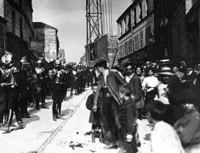




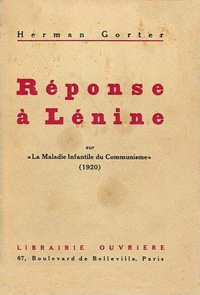







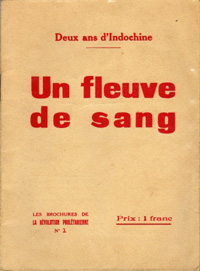


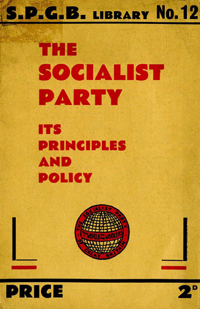
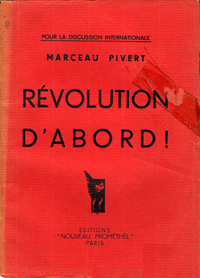





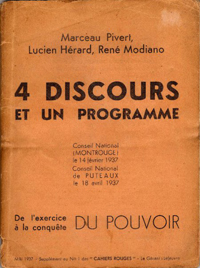



 Brochure sur l'assassinat d'A. Nin
Brochure sur l'assassinat d'A. Nin 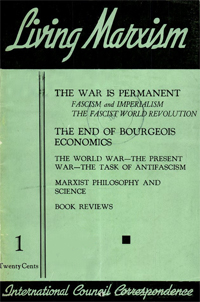
 Numéros de L'Insurgé de 1942 et 1943
Numéros de L'Insurgé de 1942 et 1943
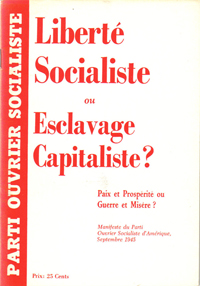

 Brochure Spartacus
Brochure Spartacus


 Mémorial de
Mémorial de 





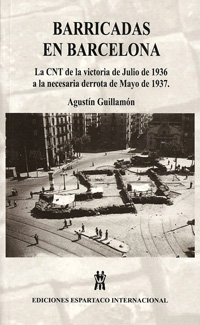

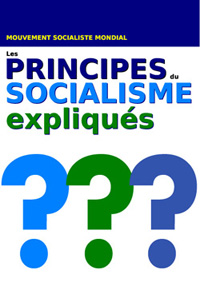
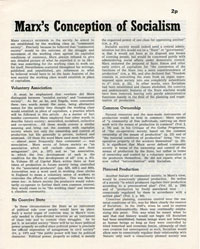













 page
page



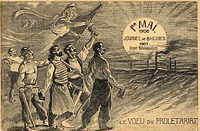

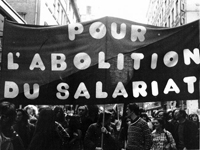
Vous devez être connecté pour poster un commentaire.